

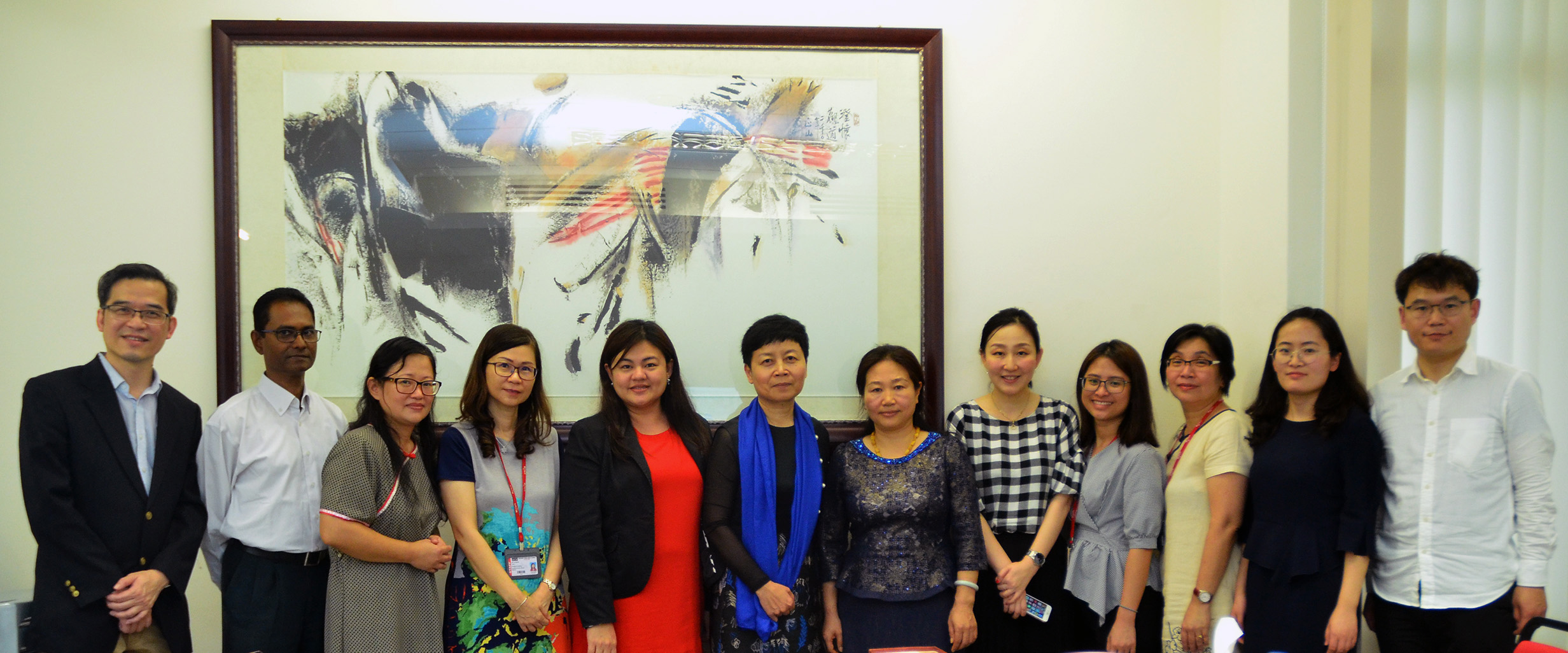
From left: Dr Wong, Dr Gerard, Dr Chong, Dr Lee, Dr Wei, Prof Zheng,
Prof Ma, Dr Chen, DCInterNet assistant manager Chin Sau Lai, Division of
Human Resource Kampar Campus Head H’ng May Eng,
Dr Xu and Dr Li
UTAR Centre for Learning and Teaching (CLT) received four delegates from Dezhou University at Kampar Campus on 28 March 2019.
Present for the UTAR-Dezhou University Collaborative Symposium, the Dezhou delegates included Human Resource Department Director Prof Zheng Xiaoyan (郑晓燕), English College Department Dean Prof Ma Yingxin (马应心) and lecturers Dr Li Long (李龙) and Dr Xu Tianhua (徐田华). They were cordially received by CLT Chairperson Dr Wei Chooi Yi, Faculty of Arts and Social Science (FAS) Dean Dr Lee Lai Meng, Division of Community and International Networking (DCInterNet) Deputy Director Dr Chen I-Chi and Institute of Postgraduate Studies and Research Deputy Director for Kampar Campus Dr Chong Yee Lee. Also present for the symposium were FAS Acting Deputy Dean for R&D and Postgraduate Programmes-cum-Head of Programme for PhD (Social Science) Dr Gerard Sagaya Raj a/l A Rajoo as well as FAS Department of Languages and Linguistics (DLL) lecturers Bharathi a/p Mutty and Kristina a/p Francis.
Welcoming the delegates to UTAR Kampar Campus and also to FAS, Dr Lee also gave a brief introduction on the faculty’s history, organisation structure, staff expertise and available undergraduate as well as postgraduate programmes. Both Dr Lee and Prof Ma also expressed their fervent hopes to see collaborations between FAS and Dezhou University involving academics and students being carried out in the near future.
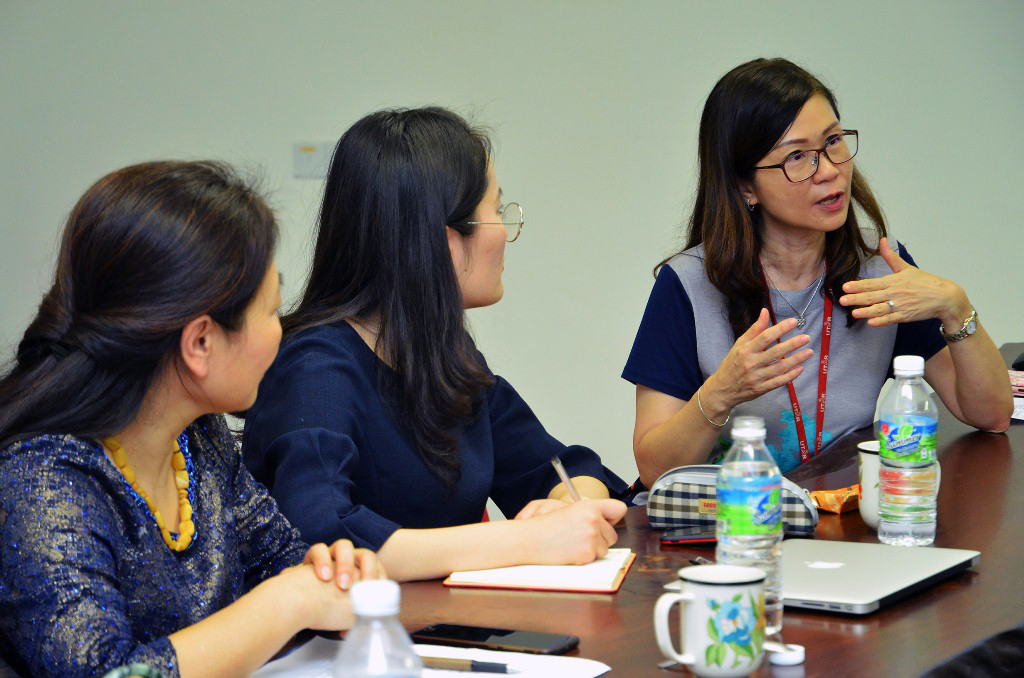
Dr Lee (right) explaining the programmes available at FAS and its various projects while Prof Ma (left) and Dr Xu look on
Kickstarting the exchange in teaching and learning in English was Dr Gerard who presented his finding titled “Reading strategies and gender differences: Is there a difference?” which investigated the reading strategy use of English as a Second Language (ESL) students in a Chinese independent school as well as the differences in reading strategy use according to gender. “The results showed that there is a difference in reading strategy use by the Chinese ESL readers and the use of reading strategy is also determined by the proficiency level,” explained Dr Gerard. He also added that based on his findings, good readers employed more reading strategies than the average readers in order to comprehend the texts. In addition to that, gender was not a significant determiner in the use of reading strategy, which include skimming, scanning, inferencing, rereading, first-to-second-language transfer and monitoring comprehension.
This was followed by Bharathi’s presentation titled “Flipping the classroom to teach grammar to undergraduates” in which she explained the meaning of the flipped classroom and the purpose of her research. Using UTAR’s very own web-based learning environment (WBLE2) as a subject, the research’s objectives are to discover the effectiveness of WBLE2 and the perceptions of students and academics using it, but with the focus on grammar teaching and learning. “Our preliminary findings show that after the experimental week, there are improvements reflected in the quizzes. As for the perceptions, the lecturers find that students are more independent because they had to answer the questions on their own. The students also become less passive and more critical in their thinking. As for the students, they felt that the lessons are more interesting and have more time to digest the lessons. It also boosts their independence in learning,” the English lecturer continued.
Kristina’s “Design and development of a flipped professional development massive open online course (FiT-PD MOOC) for university educators” shed light on teachers’ professional development, its various challenges and also importance. “Most traditional professional development are ineffective because they lack content focus, active learning, coherence, duration and cooperation. Therefore, this research focuses on flipped professional development concentrating more on teachers, but in the form of MOOC,” mentioned Kristina. She also pointed out that her research objectives are to identify the problems and needs by ESL university educators in the existing professional development programmes. Besides obtaining the validation from experts, Kristina’s research also aims to evaluate the ESL university educators’ acceptance and usability towards the FiT-PD MOOC.

From left: Dr Gerard, Bharathi and Kristina presenting their research findings
Thanking the trio for sharing their findings and insights, Prof Ma also
took the center stage to present her study titled “College English CBI
teaching and evaluation reform and practice”. Speaking on five areas,
namely the educational reform background, goals, practice approach,
educational practice and effect of educational reform, Prof Ma also
introduced the essential role of Dezhou University in the cultivation of
talents via English teaching. “In line with Dezhou University’s
innovative applied talents training goal, we apply the concept of
content-based instruction construction of subject knowledge and language
skills. This is also done so with the combination of the English course
system and scientific evaluation system to cultivate proficient language
skills, high-order thinking skills ability, patriotism and also foreign
language talents,” the Dean said.
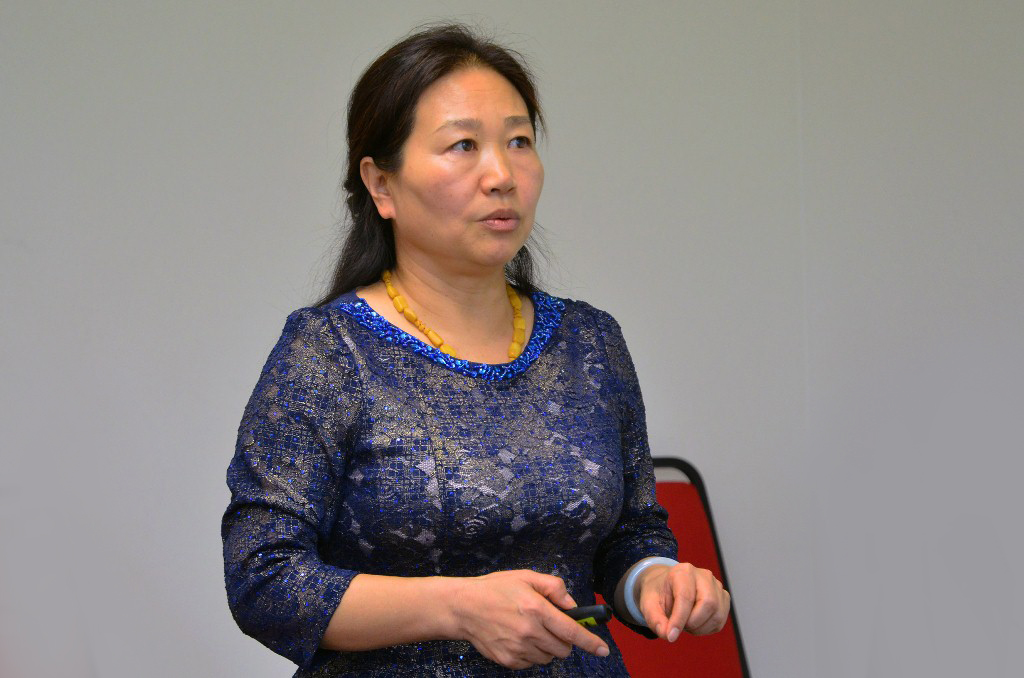
Prof Ma introducing Dezhou University’s approaches in English teaching and learning
Besides exchanging views on effective English learning and teaching, the delegates were also impressed by UTAR’s prodigious growth as a not-for-profit private university in just a span of 17 years. To deepen their understanding on the University’s various initiatives in the areas of teaching, R&D, training, industry partnerships, community engagements and so on, they were also introduced to centre chairpersons as well as academics. They included Institute of Management and Leadership Development Director and Belt and Road Strategic Research Centre (BRSRC) Chairperson Prof Dr Cheng Ming Yu and Faculty of Science (FSc) Department of Biological Science academic Assoc Prof Dr Wong Hann Ling.
Besides introducing to the delegates on UTAR’s appointment by China’s State Administration of Foreign Expert Affairs (SAFEA) as one of the recognised overseas training providers, Prof Cheng also presented the initiatives by UTAR’s BRSRC in line with China’s Belt and Road Initiative. Dr Wong also presented several success stories of FSc’s research projects in helping the industry.
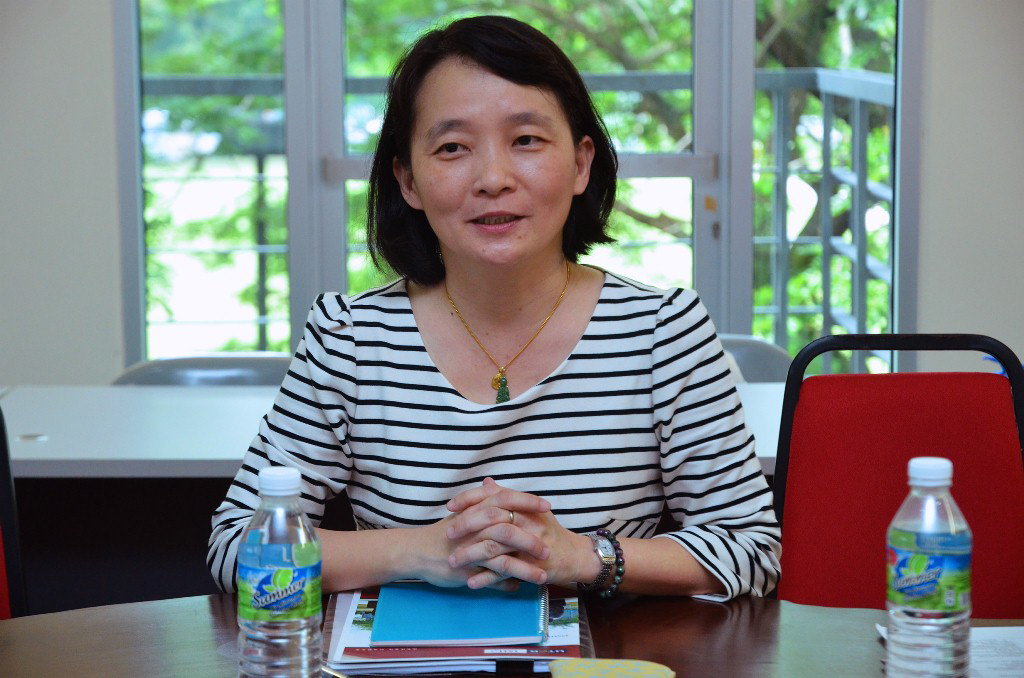
Prof Cheng explaining to the delegates IMLD’s many collaborations with China and also the research initiatives by BRSRC on the Belt and Road Initiative
The visit ended with a souvenir presentation and group photograph session.

Dr Lee (left) and Prof Ma exchanging souvenirs
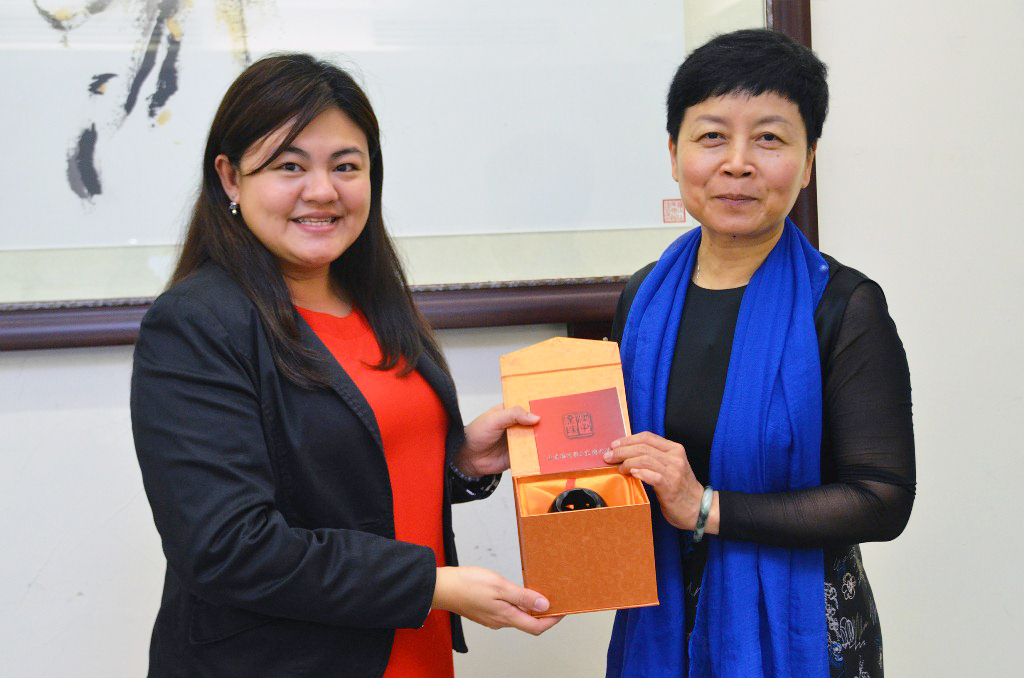
Dr Wei (left) receiving souvenir from Prof Zheng
An institution of higher learning with a global outlook, UTAR currently has over 330 partners from over 28 economies which have brought about mutual initiatives such as staff and students exchange, joint research and supervision, study tours, internships, cyber classrooms, industry consultation and so on and so forth. With China alone, UTAR has over 60 collaborative partners comprising universities and corporations.
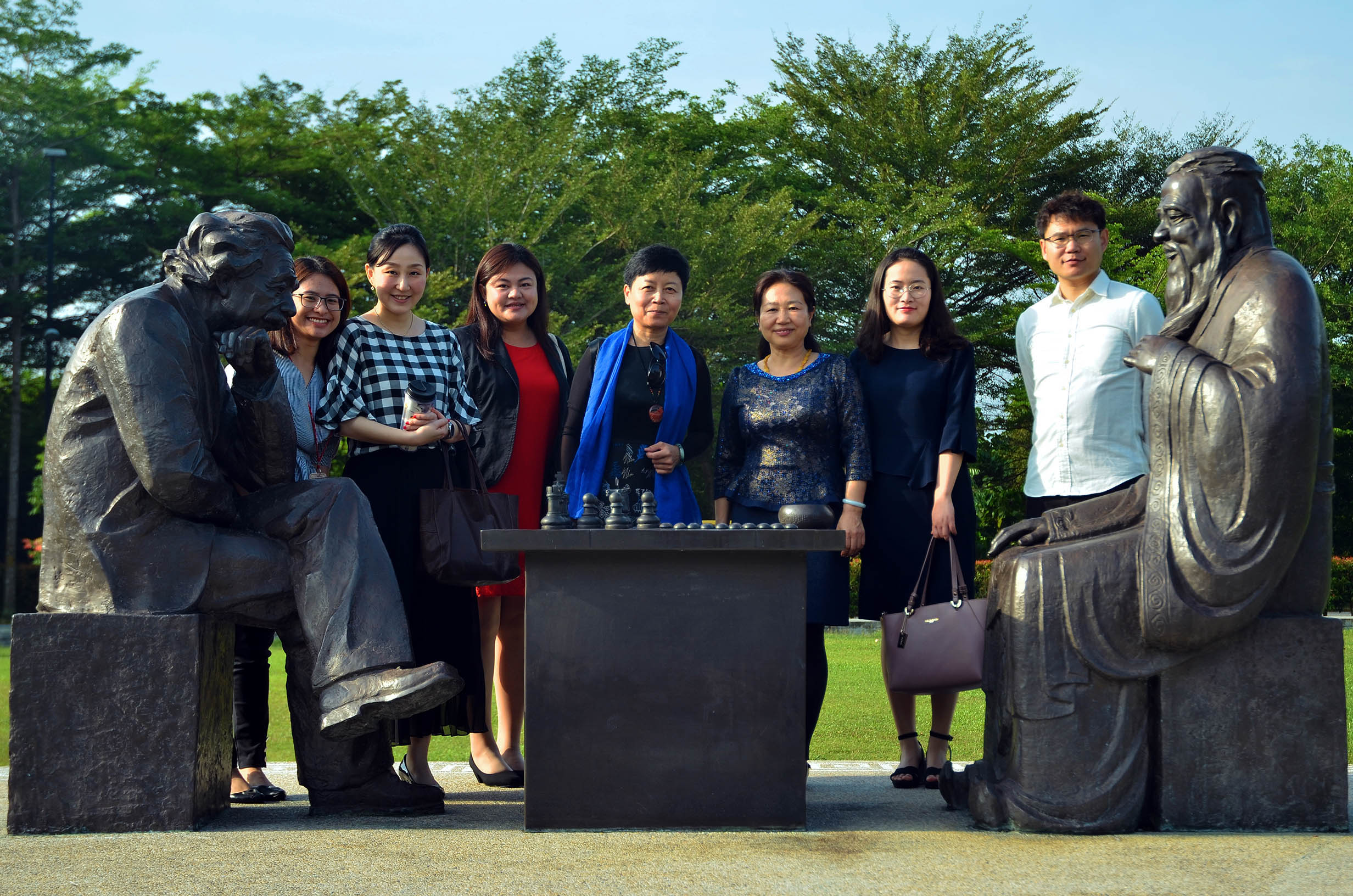
From left: Chin, Dr Chen, Dr Wei, Prof Zheng, Prof Ma, Dr Xu and Dr Li visiting the Confucius-Einstein bronze sculptures site
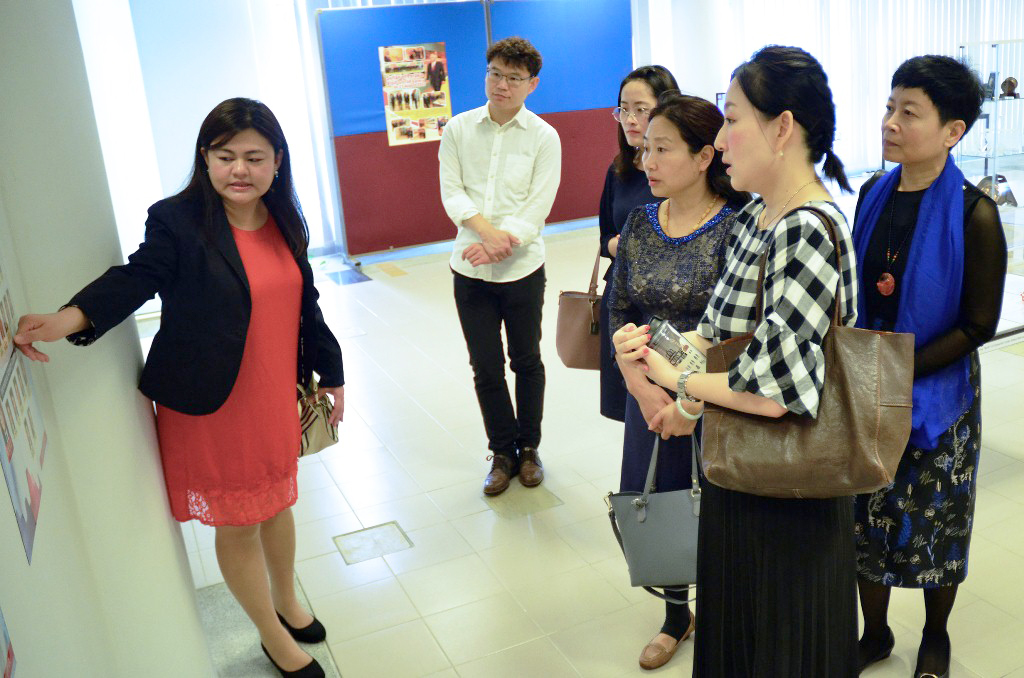
Dr Wei (most left) explaining to the delegates the University’s organisational structure
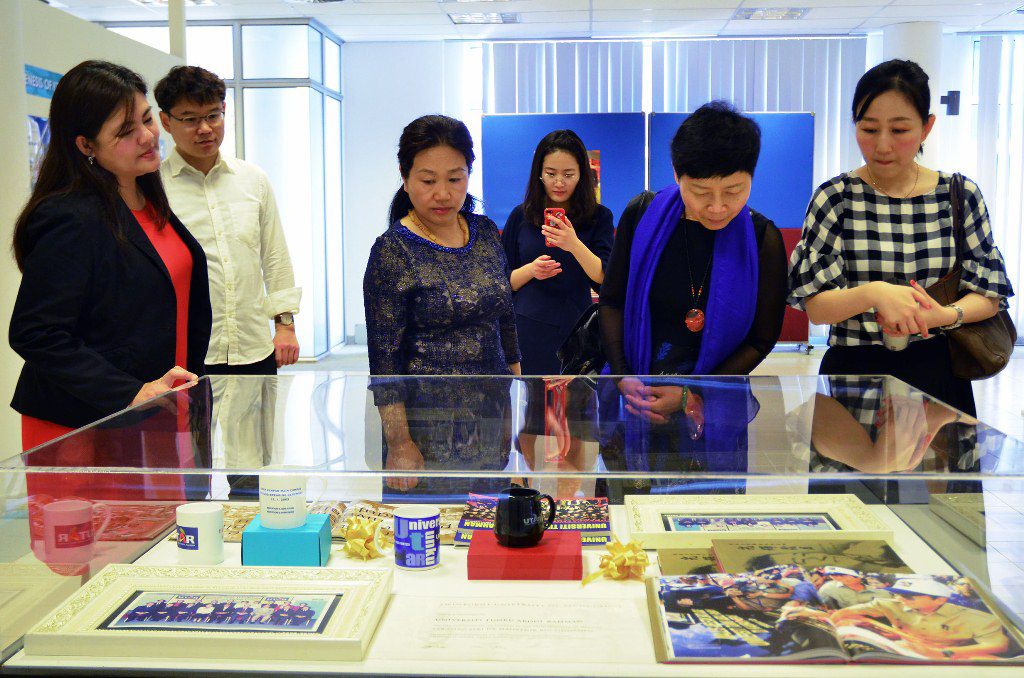
The delegates admiring the exhibits commemorating UTAR’s establishment which were displayed at the UTAR Gallery
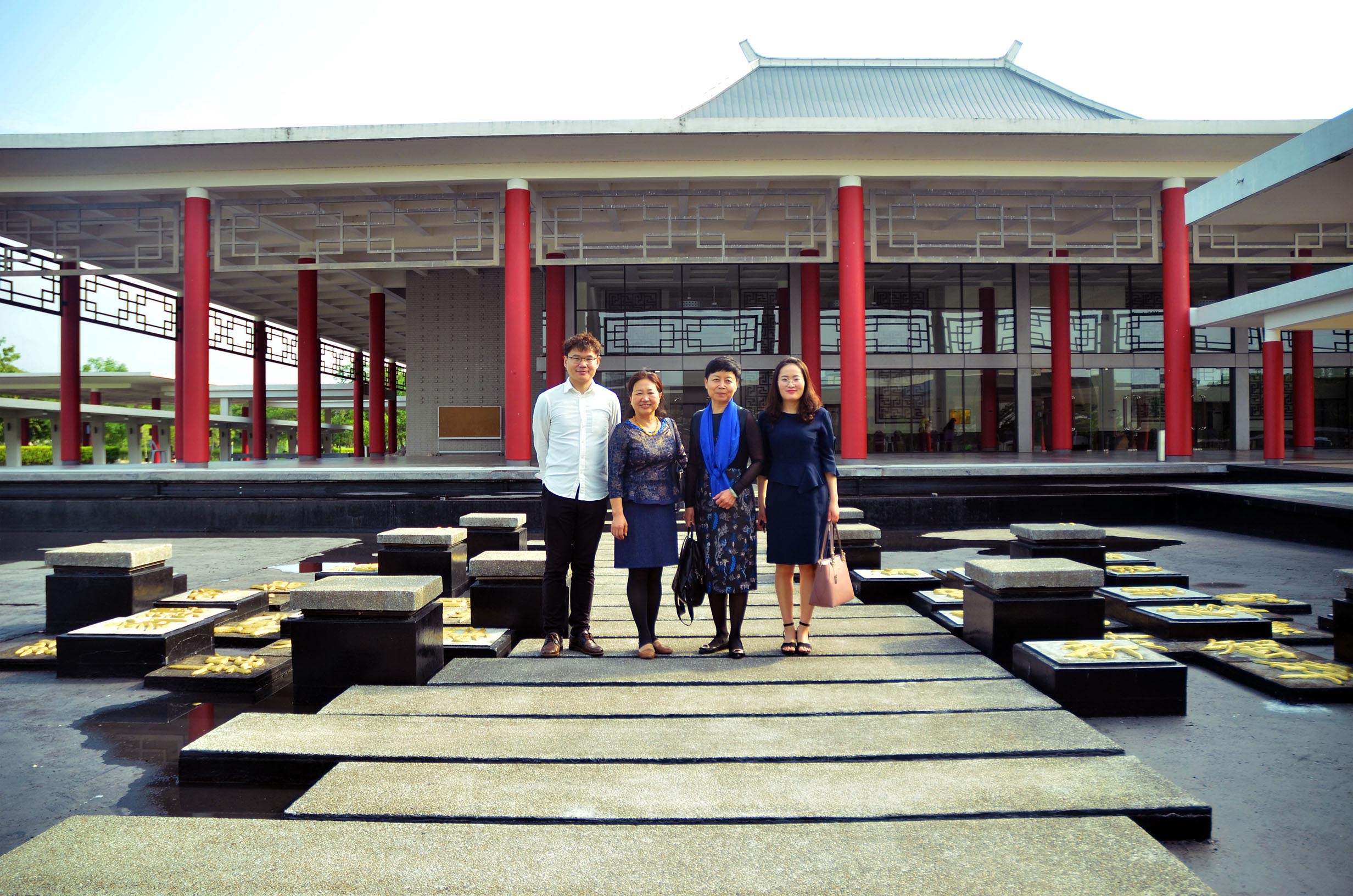
From left: Dr Li, Prof Ma, Prof Zheng and Dr Xu visiting the palatial Dewan Tun Dr Ling Liong Sik during the campus tour
© 2019 UNIVERSITI TUNKU ABDUL RAHMAN DU012(A).
Wholly owned by UTAR Education Foundation Co. No. 578227-M LEGAL STATEMENT TERM OF USAGE PRIVACY NOTICE